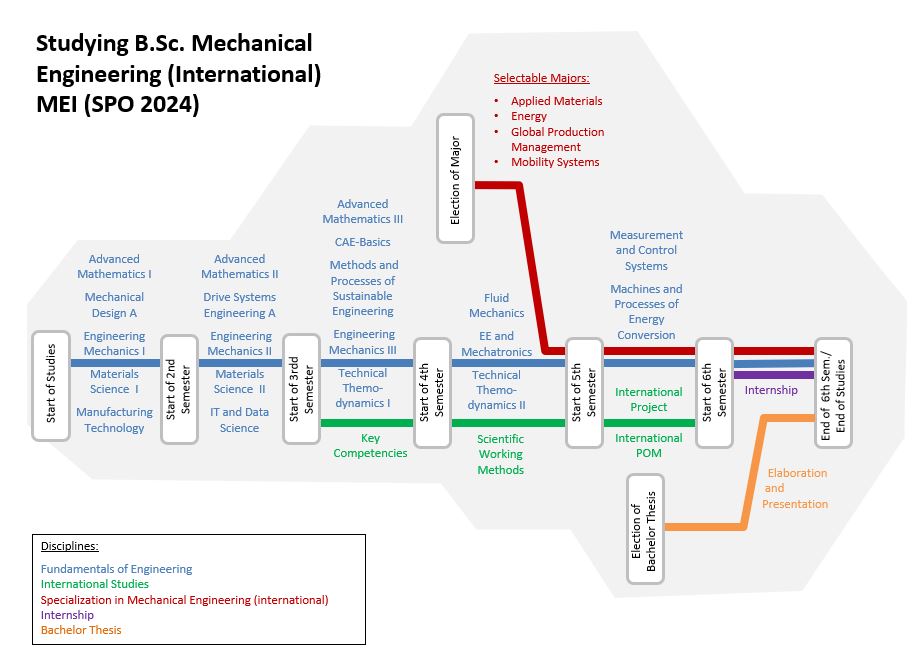Mechanical Engineering (International)

What is Mechanical Engineering?
Mechanical engineering is a field of technology that has an impact on nearly every aspect of modern life. Whether it’s the innovative technology in household appliances like coffee machines and washing machines, the advanced development of vehicles like cars and airplanes, or the precise medical technology such as endoscopes—mechanical engineering is present everywhere. It plays a crucial role in industry, from the production of manufacturing machines and the application of robotics to the energy sector, where it contributes to the development of wind turbines and solar panels. Even everyday office equipment like printers and copiers benefit from innovations in mechanical engineering. Overall, mechanical engineering forms the foundation for many technologies that make daily life more efficient and comfortable, offering a wide range of career opportunities for engineers.
What does a Mechanical Engineer do?
A mechanical engineer is someone who designs and builds machines and technical devices. The main tasks include designing machines and drawing up plans. Equally important is the process of building and testing prototypes. Optimizing machines to improve their functionality and efficiency is also part of their responsibilities. In addition, the mechanical engineer must select appropriate materials and oversee the production of the machines. Maintenance, which includes repairing and servicing machines, is also within their scope of work. Another essential aspect of their role involves calculations, simulations, and project management. Finally, the mechanical engineer prepares documentation, such as user manuals and technical papers. Mechanical engineers work in a wide range of industries, from the automotive sector to aerospace.
Why should you study Mechanical Engineering at KIT?
The Karlsruhe Institute of Technology (KIT) is one of the leading technical universities worldwide, renowned for its excellence in engineering education and research. One of KIT's key strengths is its close integration of theoretical knowledge with practical experience. Students have the opportunity to deepen their practical skills in the local automotive and mechanical engineering industries. KIT's international network with partner universities and industry allows students to gain valuable global experiences. Access to cutting-edge technologies and innovative projects continuously broadens their horizons. First-class professors and lecturers ensure and continually enhance the high quality of education. Comprehensive student support services assist learners throughout their studies. Graduates of KIT enjoy excellent career prospects.
What are the objectives of the program?
The Bachelor's program in Mechanical Engineering (International) at KIT prepares students for an international career in mechanical engineering, whether in industry, the service sector, or public administration. During the course of study, important skills such as effective communication, project planning and organization, teamwork, and intercultural competence are developed.
At the beginning of the program, students acquire foundational knowledge in mathematics, mechanics, thermodynamics, materials science, and computer science. Additionally, basic knowledge of electrical engineering and computer science is provided. As the program progresses, this knowledge is practically applied in areas such as design, logistics and management, as well as production and manufacturing planning. The program also covers an understanding of business functions, international accounting standards, and international law.
Through practical projects and an industrial internship, students can directly apply and deepen the knowledge they have acquired. The combination of theory and practice in the core subjects, supplementary courses, and the Bachelor's thesis promotes skills in research, problem-solving, and technical system planning. The program is aligned with international standards and optimally prepares students for a global career.
Special Features of the Degree Progam
A special feature of the degree program is the collaboration between KIT and the Carl Benz School of Engineering. The Carl Benz School offers a study preparation course, the Pre-Semester, as well as a study support program, the College Program, specifically designed for international students. Participation in the Pre-Semester is strongly recommended for students with "indirect" admission to the degree program, in order to successfully pass the associated external entrance examination. Participation in the College Program is optional.
Costs of Tuition for the MEI course
The costs for the winter and summer semesters for EU/EAA students amount to €190.70 (excluding tuition fees), while international students have to pay an additional tuition fee of €1,500 per semester in addition to the general fees.
If you wish to participate in the College Program, you can find an overview of the fees here, along with the information on the costs for the Pre-Semester.
Cost of Living
The average expenses of a student in Karlsruhe, including fees and depending on personal circumstances, range between €800 and €900 per month. This amount includes rent, food, clothing, health insurance, phone/internet, study materials, and transportation from home to university.
Study Financing Options
Many students at the Karlsruhe Institute of Technology (KIT) work as "Hiwis" during their studies. This means that they apply for a position as a student assistant, which offers them the opportunity to gain practical experience and apply theoretical knowledge. The tasks include supporting research projects, assisting in teaching activities, literature research, data analysis, and providing technical and programming support. The benefits include practical experience, networking opportunities, valuable work experience, flexible working hours, and additional income.
More tips on financing and scholarships.
The Ideal Applicant Profile
For an application to the Mechanical Engineering program at the Karlsruhe Institute of Technology (KIT), good academic grades, particularly in mathematics and physics, are an advantage. It is particularly fulfilling to have a strong interest in technology and a passion for engineering subjects. Creativity and perseverance help to develop innovative ideas and fulfil challenging tasks. Teamwork skills are essential, as many projects are carried out in groups. Furthermore, practical experience, such as a technology-related hobby, can also be beneficial.
And After Graduation?
After completing a Bachelor's degree at KIT, students can seamlessly continue their studies, as graduates have direct access to the Master's program in Mechanical Engineering. On the job market Mechanical engineers can expect excellent career prospects due to the high demand for qualified engineers. There are a wide range of opportunities in industries such as the automotive industry, aerospace, energy, mechanical engineering, and medical technology, offering many exciting career paths. Career prospects are promising, with opportunities for further education, specialization, and promotion to leadership positions. International career opportunities exist due to the global activities of many German companies. Mechanical engineering is a future-proof field, especially with the focus on digitalization, automation, and sustainable technologies. With technical interest, creativity and problem-solving skills, a successful career with excellent earning potential is easily achievable.
Interested in studying at KIT?
We look forward to it! Here you can find more information about applying and starting your degree programme!

